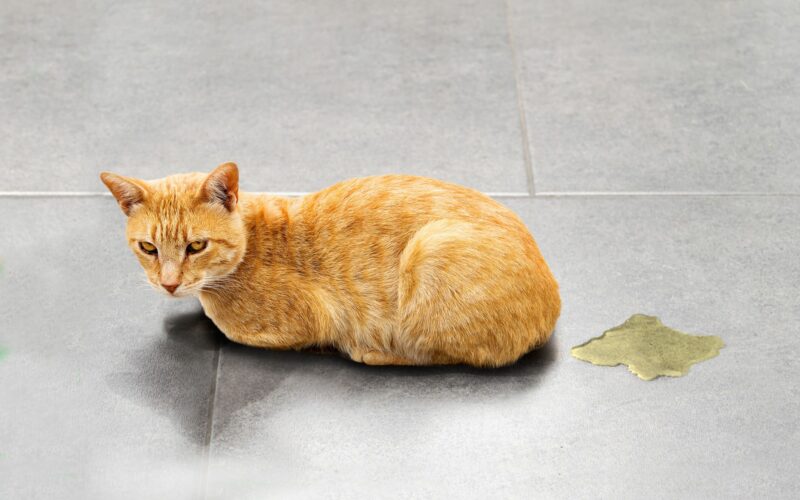As cat owners, we know that each cat has its habits and ways of doing things. Some of them can be cute, but others can be scary. What might worry us is if our cats often pee outside their litter box.
This could indicate a deeper health problem, like a urinary tract infection or bladder stones. But there are also several other reasons why cats may urinate a lot. In this list, we’ll look at seven possible reasons your cat isn’t using the litter box.
This way, you’ll know what’s going on and be able to help your cat get back to good health and good litter box habits.
1. Urinary tract infection (UTI)
Urinary tract infections (UTIs) are a common reason cats often go to the bathroom. When bacteria get into the bladder or urethra and cause inflammation and pain, these infections happen. Cats of any age can get UTIs, but older cats and cats with weak immune systems are more likely to get them.
If your cat has a UTI, it may use the litter box often or have accidents outside it. They may also look in pain or have trouble going to the bathroom. When trying to urinate, your cat may sometimes make noises that show pain or discomfort.
Your vet will do a urinalysis and suggest a urine culture to determine the bacteria causing the infection. UTIs are usually treated with a course of antibiotics given by your veterinarian. It’s essential to administer the medicine as prescribed and as long as directed to ensure the infection is fully treated and doesn’t come back.
In addition to antibiotics, your vet may suggest that you change your cat’s eating or drinking habits to help prevent UTIs in the future. For example, you may be told to give your cat more water or a special diet to support its urinary health.
2. Bladder stones
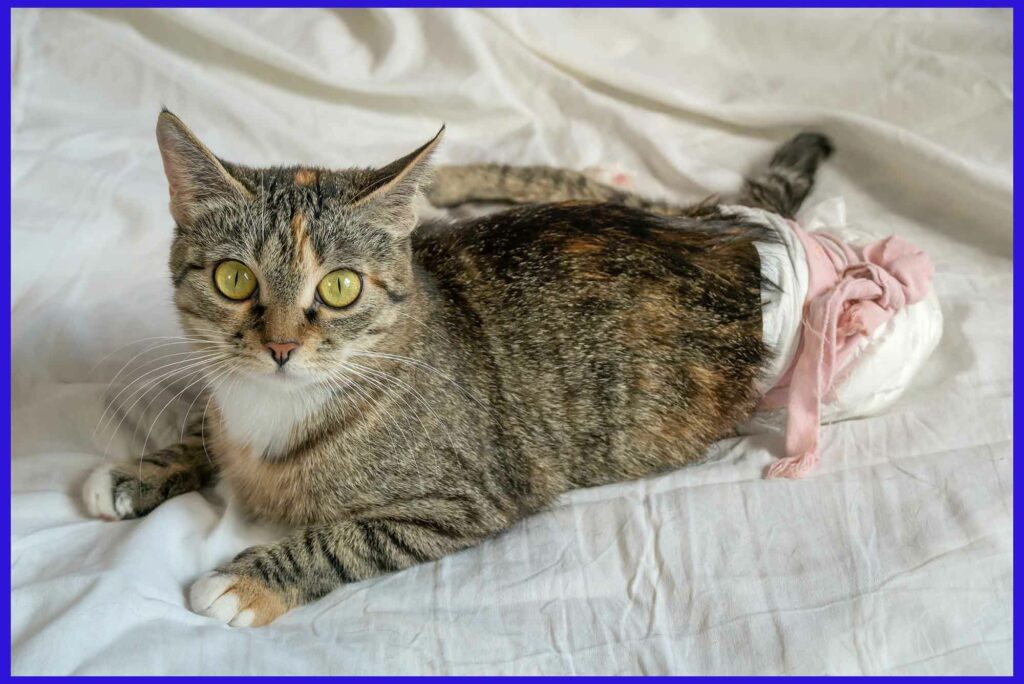
Bladder stones are a common health problem in cats that can make them go to the bathroom more often and hurt. Most of the time, these stones are made up of clumped minerals.
They come in all sizes and shapes. Cats with bladder stones urinate often but only a little bit at a time, urinate painfully, and strain when trying to urinate. If you see any of these signs in your cat, you should immediately take them to the vet. The vet will use imaging tests to determine if the dog has bladder stones and suggest the best treatment.
If the stones are small enough, they can be broken up by eating a certain way. But surgery may be needed if the kidney stones are too big or if they cause blockages. During the surgery, the stones will be taken out of the bladder. This will relieve the symptoms and stop any further problems. Your vet will tell you what the best thing to do is based on your cat’s specific needs.
It’s important to remember that cats can get bladder stones again, so following the vet’s advice for care and monitoring is essential. Your cat is less likely to get bladder stones if you feed it a special diet and ensure it stays hydrated. Your cat can get better from bladder stones and return to living a happy, healthy life with the proper care.
3. Diabetes
Diabetes is a metabolic disorder that changes how the body uses glucose, which causes blood sugar levels to be too high. Diabetes can cause more severe health problems like kidney damage, nerve damage, and even blindness if untreated.
So, monitoring your cat’s urination habits and seeing a vet if anything changes is essential. If your cat has diabetes, your vet will work with you to make a personalized treatment plan. This may include giving insulin injections, checking your cat’s blood sugar levels, and changing your cat’s diet. Cats with diabetes can live happy, healthy lives if they receive proper care.
In fact, with the proper care and treatment, some diabetic cats have even stopped having the disease. Regular vet visits are essential to ensure your cat’s diabetes is controlled and catch any problems early. If you think your cat might have diabetes, don’t hesitate to talk to your vet.
4. Anxiety or Stress
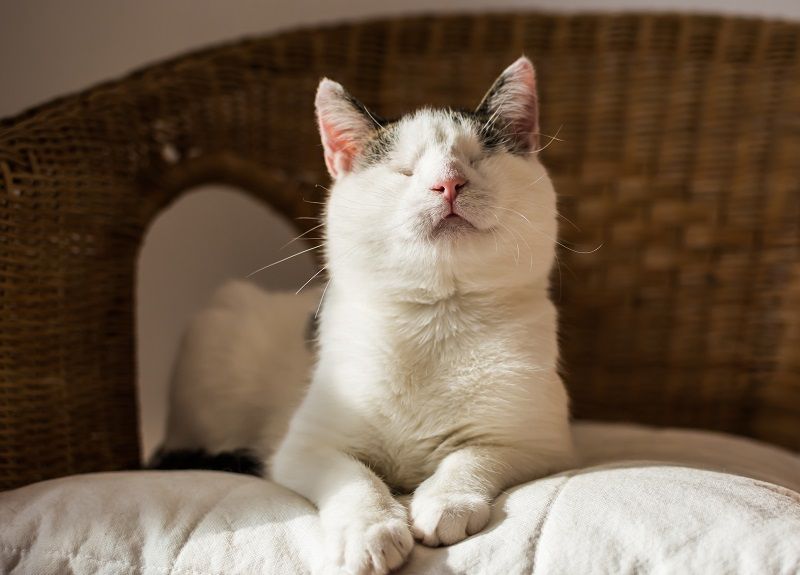
Cats are known for being sensitive. Many things, like changes in their environment or routine, can cause them to feel stressed or anxious. If you just moved to a new house or got a new pet or family member, your cat may feel stressed or anxious and urinate outside the litter box more often.
In addition to urinating, cats can show signs of stress or anxiety by grooming themselves too much, hiding, or changing how they eat. To solve this problem, you can give your cat a comfortable and safe place to live, like a quiet, secluded spot where it can go when it feels too much.
You could also use pheromone sprays or diffusers to create a calm environment. You may also add more playtime and interactive toys to your cat’s daily routine to reduce stress.
Also, it might help to talk to your vet or a professional animal behaviorist about how to deal with your cat’s anxiety and reduce the number of times they urinate outside the litter box.
5. Inflammatory Bowel Disease (IBD)
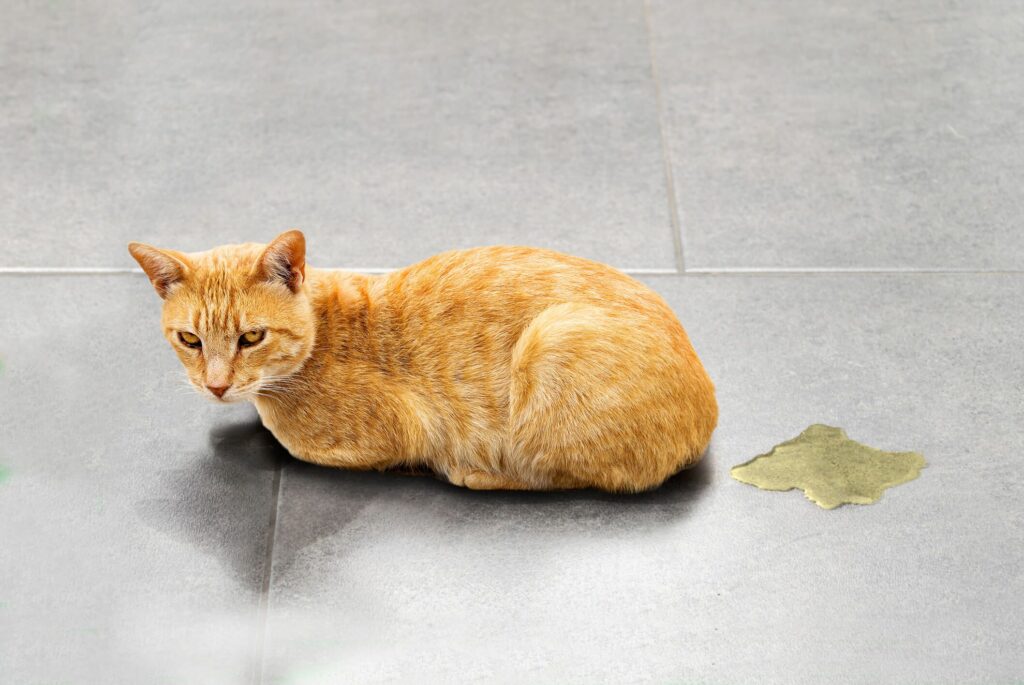
Inflammatory Bowel Disease (IBD) can be hard to diagnose because its symptoms can be like other health problems. But some things could make someone think they have IBD.
For example, IBD could indicate that your cat often throws up, has diarrhea, or urinates more than usual. Cats with IBD may also have less appetite, lose weight, and feel tired.
If your cat has IBD, your vet may suggest that you change what it eats as part of the treatment plan. For example, a hypoallergenic diet might be indicated because some cats with IBD can’t handle certain foods. Your vet may also give you medicine to help reduce swelling and deal with symptoms.
IBD is a chronic condition, so it may need to be treated for the rest of your cat’s life to ensure they stay healthy and happy. If IBD isn’t treated, it can sometimes lead to severe problems like dehydration or poor nutrition. Seeing a vet is essential if you think your cat has IBD.
6. Bladder inflammation
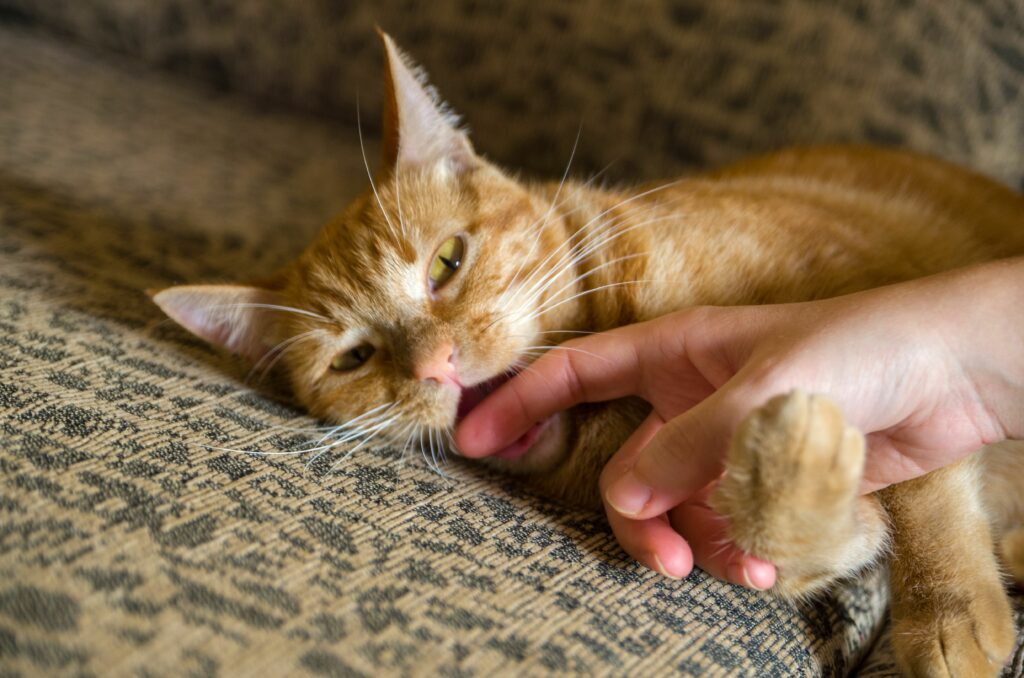
Bladder inflammation, also called cystitis, is a common problem in cats that can cause pain and the need to go to the bathroom often. Bacterial infections, bladder stones, or stress are just some of the things that can lead to this condition.
For example, a cat scared because its environment has changed may get cystitis. Cats with cystitis may urinate often and in small amounts, showing signs of pain or discomfort when they urinate. In worse cases, the cat might even pee blood. You must take your cat to the vet for a proper diagnosis if your cat has cystitis. The vet will probably do a physical exam and suggest more diagnostic tests, like urinalysis and imaging tests, to find out what’s wrong.
Once your cat has been diagnosed, it may be given antibiotics to treat bacterial infections. Painkillers are prescribed to make them feel better. Expect to implement dietary changes to stop future flare-ups. Regarding cats and cystitis, it’s important to remember that prevention is critical.
Ensuring your cat has a clean litter box, fresh water, and a low-stress environment can help keep the condition from happening. Adding supplements to your cat’s diet may also help prevent cystitis in some cases. By watching how your cat acts and giving it the proper care and attention, you can help prevent cystitis and ensure it stays healthy and happy.
7. Kidney Disease
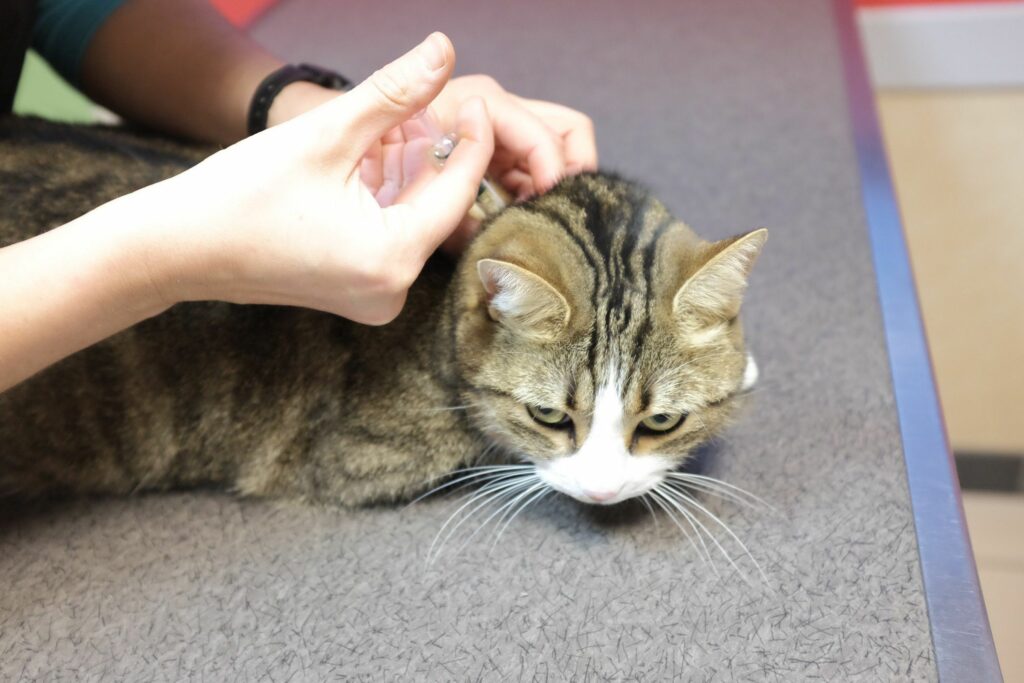
Kidney disease in cats, especially older ones, can be a severe problem. When the kidneys don’t work right, it’s hard for the body to eliminate waste and keep the right balance of fluids. When you have kidney disease, your body tries to get rid of extra fluids by making you urinate more often.
Other signs are increased thirst, losing weight, and feeling tired. Regular veterinary checkups and blood and urine tests are essential for catching kidney disease early. Even though there is no cure for kidney disease, finding it early on can help the cat deal with it better and improve its life.
Changes to a person’s diet can help reduce the amount of work the kidneys do. Medication can help control blood pressure and improve kidney function. Sometimes, fluids may need to be put under the skin (subcutaneously) to help a person stay hydrated.
It is imperative to do what the vet says and keep a close eye on the cat at home for any changes in behavior or symptoms. With the proper care and treatment, many cats with kidney disease can live long, happy lives.
Final Thoughts
Please pay attention to how your cat urinates because it could be a sign of health problems. Call your vet immediately if your cat is peeing or urinating more often or in larger quantities.
During the visit, your vet will do a complete physical exam, ask about your cat’s eating and drinking habits, and, depending on the symptoms, may do more tests. Antibiotics can be used to treat a urinary tract infection. If your bladder is blocked, you may need surgery or a catheter.
Hormonal imbalances and diabetes may require long-term care, like changing your diet, getting daily injections, and going to the doctor often. Early detection and immediate care from a vet can make a big difference in your cat’s health and well-being.
The good news is that proper care can manage or even cure many health problems. Paying attention to how your cat acts and taking it to the vet when needed can ensure a happy, healthy life full of lounging, playing, and lots of love and affection.
Further Reading
